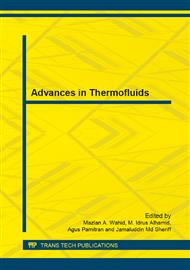p.257
p.262
p.268
p.273
p.280
p.285
p.292
p.301
p.307
The Effect of Fuel Additives on Gasoline Heating Value and Spark Ignition Engine Performance: Case Study
Abstract:
Today fuel additives had been used widely for the enhancement of fuel economy and engine performance. Fuel additives are substance that acts as catalysts for the completeness combustion of fuel in order to increase the heat released and hence the work output will be improved. The purpose of this paper is to investigate the effect of the additives on fuel heating value and engine performance. In this study, three different additives available in the market have been chosen to determine the effect on heating value and engine performance when mixed with fuel. Two types of test were conducted, namely the calorific value and engine performance test. The first test was conducted using a bomb calorimeter with test method in accordance with the DIN 51900 and ASTM D240. The later test was done using engine test bed and with the agreement of BS 5514 (Parts 1 to 6), Reciprocating Internal Combustion Engines: Performance, and SAE 1349 Standard Engine Power Test Code. The study shows that fuel additives can cause a standard fuel to have higher heating value up to 5%. As for the engine performance, the engine brake thermal efficiency and brake mean effective pressure were increased up to 8% and 10% respectively. The specific fuel consumption can be reduced up to 9%.
Info:
Periodical:
Pages:
301-306
DOI:
Citation:
Online since:
August 2013
Keywords:
Price:
Сopyright:
© 2013 Trans Tech Publications Ltd. All Rights Reserved
Share:
Citation:


